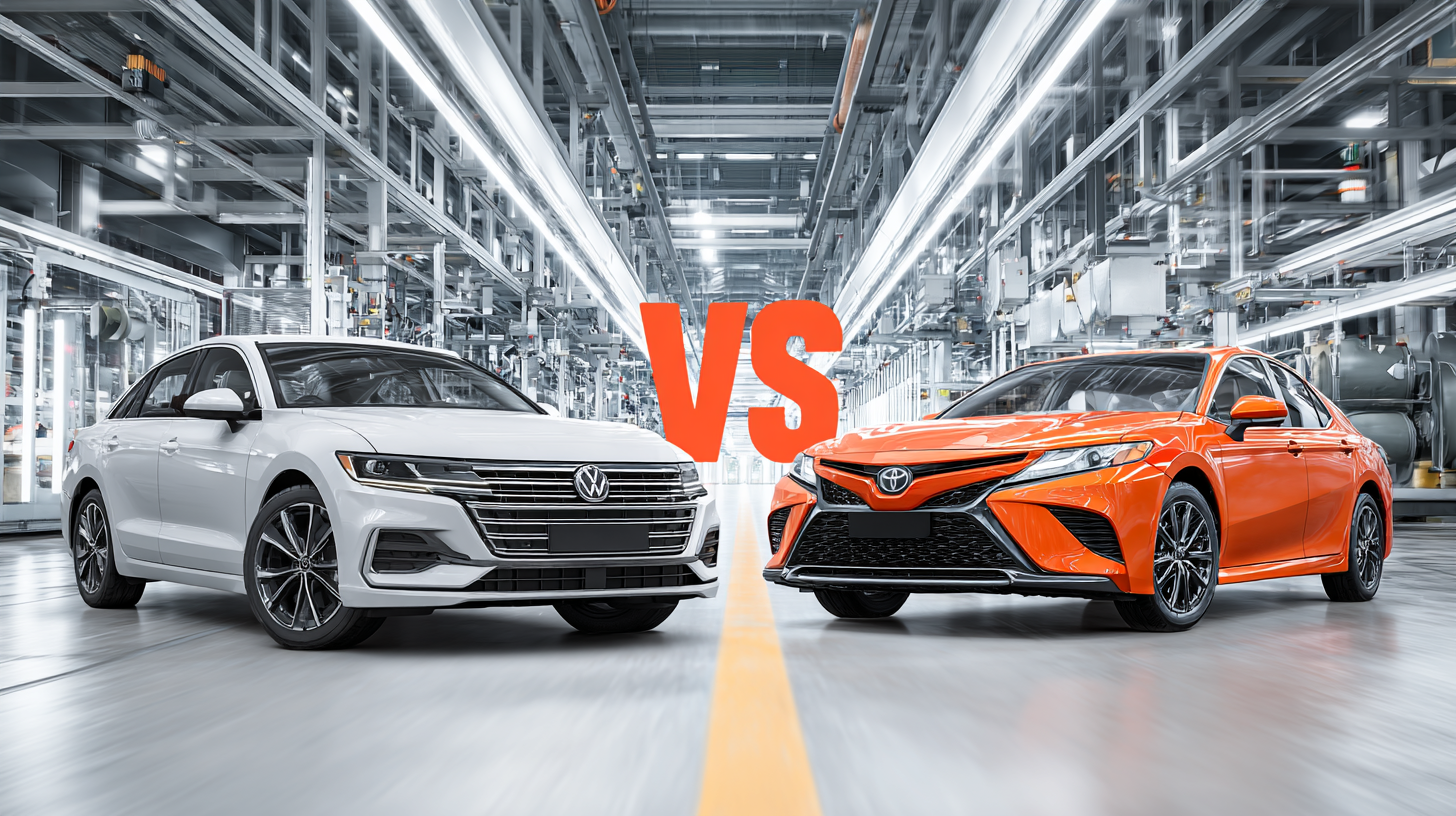When it comes to Volkswagen vs Toyota, which automotive giant truly delivers the best value for your money? These two manufacturers represent distinctly different approaches to car ownership, with each brand offering unique advantages worth considering before your next purchase.
Data shows Toyota excels in reliability, depreciation rates, and value retention, with higher quality ratings in all model comparisons analyzed. Toyota vehicles consistently outperform Volkswagen in long-term ownership metrics, with lower depreciation rates in 14 out of 14 comparisons. Meanwhile, Volkswagen holds the edge in initial affordability, with lower new vehicle prices in 10 out of 14 comparisons and more competitive used car pricing. The German manufacturer also scores slightly better in safety ratings across multiple models.
History and Heritage of Both Automakers
Toyota and Volkswagen stand as automotive giants with rich histories dating back to the 1930s. Both manufacturers established their automotive divisions in 1937, though their founding stories and philosophies reflect different cultural and historical contexts that continue to influence their approach to car manufacturing today.
Volkswagen’s German Engineering Legacy
Volkswagen emerged from a vision to create a “People’s Car” in Germany, with its name literally translating to that purpose. Ferdinand Porsche founded the company in 1937 at Adolf Hitler’s request, with the goal of democratizing automobile ownership and making cars affordable for the general public. The iconic Beetle became the embodiment of this mission, establishing Volkswagen’s reputation for distinctive design and accessible engineering.
Over decades, Volkswagen evolved into a global powerhouse, eventually becoming the industry’s largest car manufacturer. Today, the Volkswagen AG group encompasses 12 prestigious automotive brands including Audi, Bentley, Porsche, Lamborghini, and Bugatti. This diverse portfolio demonstrates Volkswagen’s commitment to engineering excellence across multiple market segments, from everyday vehicles to luxury performance cars.
The company’s German engineering heritage emphasizes precision, performance, and driving dynamics. This philosophy is evident in models like the Volkswagen Jetta, which delivers a more ever-changing and exciting driving experience compared to its Japanese counterparts. While Volkswagen vehicles have faced reliability challenges compared to Toyota, their emphasis on performance and driving engagement continues to attract enthusiasts who prioritize these qualities.
Toyota’s Japanese Manufacturing Philosophy
Toyota’s roots extend even further back than its automotive division, beginning in the late 19th century as a company specializing in weaving looms. Kiichiro Toyoda launched the automotive division in 1937, building on his family’s industrial expertise and innovative approach to manufacturing. This textile manufacturing background profoundly influenced Toyota’s methodical approach to car production.
The Japanese manufacturer pioneered the renowned Toyota Production System, which revolutionized manufacturing worldwide with principles like just-in-time production and continuous improvement (kaizen). These philosophies prioritize efficiency, waste reduction, and meticulous attention to quality control. Toyota’s commitment to these principles has established its legendary reputation for reliability and longevity.
Toyota’s global expansion led to the creation of the luxury Lexus brand and a diverse lineup of vehicles sold worldwide. The manufacturer’s focus on reliability and practicality resonates with consumers seeking dependable transportation rather than flashy performance. This approach explains why Toyota vehicles like the Corolla have become synonymous with dependability and value retention over time.
Data shows Toyota consistently outperforms Volkswagen in reliability metrics, with lower depreciation rates across all 14 comparable models. This stark difference in long-term reliability stems directly from Toyota’s manufacturing philosophy that prioritizes consistency and durability over cutting-edge features or performance specifications. For many owners, this translates to fewer maintenance headaches and lower total ownership costs compared to Volkswagen vehicles.
Brand Comparison: Market Position and Reputation
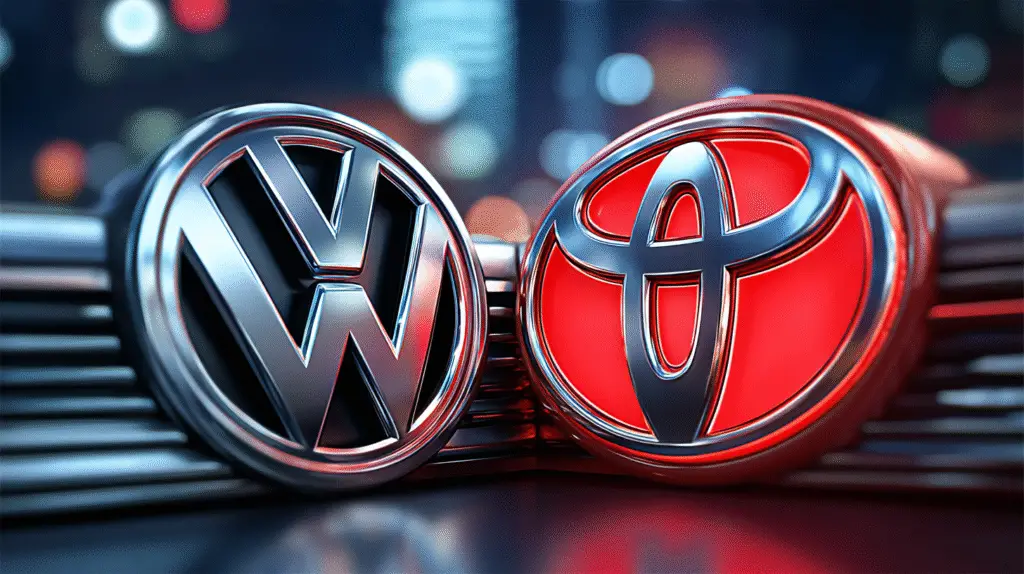
Volkswagen and Toyota represent two distinct approaches to automotive manufacturing, each with unique strengths in the global market. Their contrasting business strategies and brand philosophies directly impact their market position and consumer perception worldwide.
Global Sales and Market Share
Toyota continues to dominate global automotive sales with impressive numbers that reinforce its market leadership. In 2024, Toyota sold 9.25 million vehicles by the end of November, slightly outpacing Volkswagen’s 9.03 million vehicles for the same period. This sales advantage isn’t new—Toyota reclaimed its position as the industry’s best-selling automaker after previously trading the top spot with Volkswagen Group. Market share distribution varies by region, with Toyota maintaining strong global leadership while Volkswagen has experienced notable growth in exact markets like North America and South America.
Toyota’s consistent sales performance stems from its widespread appeal across diverse markets and customer segments. Volkswagen’s diverse brand portfolio, which includes luxury marques like Porsche, Audi, Lamborghini, Bentley, and Ducati, gives the German automaker important reach across different price points and vehicle categories even though slightly trailing in overall volume.
Brand Image and Customer Loyalty
Toyota’s reputation centers on exceptional reliability and value retention, factors that directly impact the volkswagen vs toyota reliability debate. In direct comparisons, Toyota demonstrates higher quality ratings in 5 out of 5 model comparisons and superior reliability ratings in 4 out of 5 comparisons. This reliability advantage translates to stronger resale values, with Toyota showing higher ratings for retained value in all comparable models.
Volkswagen focuses on safety and driving dynamics as core brand values. The Volkswagen Tiguan exemplifies this approach with comprehensive advanced driver assistance systems that appeal to safety-conscious consumers. In safety comparisons, Volkswagen edges out Toyota with better safety ratings in 6 out of 13 model comparisons, while Toyota leads in just 2 comparisons (with 5 resulting in ties). This advantage in safety features helps balance the volkswagen reliability vs toyota conversation for many shoppers.
Customer loyalty patterns reflect these brand distinctions. Toyota enjoys strong customer satisfaction and retention rates due to its vehicles’ longevity and lower long-term ownership costs. Toyota’s Safety Sense suite, standard across models like the RAV4, adds to this appeal. Volkswagen owners often cite captivating driving experiences and sophisticated engineering as reasons for brand loyalty, though concerns about volkswagen maintenance cost vs toyota sometimes influence long-term ownership decisions.
Performance and Engineering
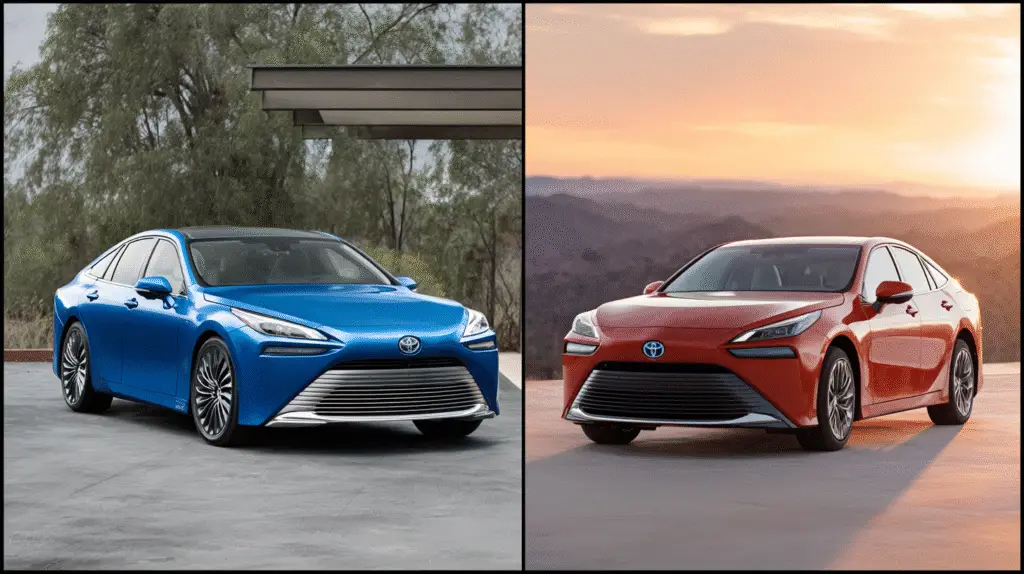
Volkswagen and Toyota showcase distinct approaches to automotive performance and engineering philosophy. Toyota prioritizes reliability and efficiency, while Volkswagen emphasizes driving dynamics and engineering sophistication that delivers a more captivating experience.
Engine Options and Power Delivery
Volkswagen’s engine lineup focuses on responsive power delivery with sophisticated engineering. The Volkswagen Jetta features a 1.5L TSI turbocharged four-cylinder engine producing 158 horsepower and 184 lb-ft of torque, delivering spirited acceleration with its eight-speed automatic transmission. Performance enthusiasts appreciate the Jetta GLI with its more powerful setup and six-speed manual transmission option that enhances driver engagement. Volkswagen’s turbocharged engines provide important low-end torque, creating that satisfying push-back-in-your-seat feeling when accelerating from a stop.
Toyota’s engine options emphasize smooth operation and long-term durability. The Toyota Corolla comes equipped with a 2.0L four-cylinder engine generating 169 horsepower and 151 lb-ft of torque, paired with a continuously variable transmission (CVT) for seamless power delivery. Toyota’s RAV4 utilizes a robust 2.5-liter engine with 203 horsepower, though it lacks the responsiveness of Volkswagen’s dual-clutch transmissions. Toyota powertrains demonstrate remarkable consistency across their performance range, prioritizing predictable power delivery over sporty characteristics.
| 2025 Model | VW Jetta | Toyota Corolla | Toyota Corolla Hybrid |
|---|---|---|---|
| Engine | 1.5L TSI turbo four-cylinder | 2.0L four-cylinder | 1.8L four-cylinder hybrid |
| Horsepower | 158 HP | 169 HP | 138 HP |
| Torque | 184 lb-ft | 151 lb-ft | 105 lb-ft |
| Max MPG City/Hwy | 29/40 | 32/41 | 53/46 |
| Drivetrain | FWD | FWD | FWD/AWD |
| Transmission | Eight-speed automatic with Tiptronic | CVT | CVT |
Fuel Efficiency and Eco-Friendly Technologies
Volkswagen combines performance with efficiency through advanced engine technology. Their turbocharged direct-injection engines deliver impressive fuel economy without sacrificing driving enjoyment, with the Jetta achieving up to 40 MPG on the highway. Volkswagen’s commitment to eco-friendly innovation includes hybrid models like the Tiguan PHEV, offering electrified power options that reduce emissions while maintaining the brand’s performance-oriented character. Their engineering approach balances efficiency with captivating driving dynamics, appealing to drivers who want both fuel savings and responsive performance.
Toyota leads the industry in hybrid technology with decades of refinement. The pioneering Prius established Toyota as the hybrid technology leader, with this expertise now extending across their lineup including the RAV4 Hybrid and Camry Hybrid. Toyota’s hybrid models consistently deliver exceptional fuel efficiency, with the Corolla Hybrid achieving an impressive 53 MPG in city driving. Their hybrid systems seamlessly integrate electric and gasoline power, creating a refined driving experience focused on efficiency without requiring driver intervention. Toyota continues investing in hydrogen fuel cell technology and battery electric vehicles, demonstrating their long-term commitment to sustainable transportation options.
Comparing fuel efficiency data reveals Toyota’s advantage in this area, with their vehicles offering higher MPG ratings in 3 out of 5 model comparisons. Toyota hybrids particularly excel in urban driving conditions, where their electric motors provide efficient acceleration from stops. Volkswagen’s turbocharged engines, while efficient for their performance level, typically can’t match Toyota’s hybrid technology for pure fuel economy numbers in real-industry driving conditions.
Model Lineup Comparison
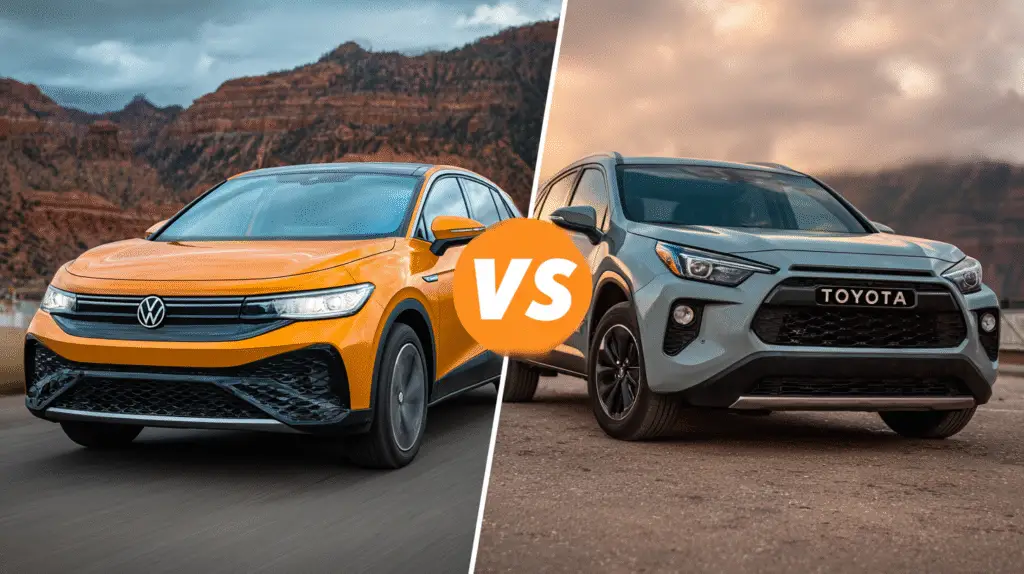
Volkswagen and Toyota offer diverse vehicle lineups that cater to different consumer preferences. Each brand showcases distinct strengths across their model ranges, with notable differences in design philosophy, features, and performance characteristics.
Sedans and Compact Cars
The 2025 Volkswagen Jetta and Toyota Corolla represent flagship compact sedans from both manufacturers, with key distinctions in space and performance. Volkswagen’s Jetta provides significantly more passenger room (94.7 cubic feet compared to Corolla’s 88.6), creating a more spacious interior experience. Toyota’s Corolla delivers 11 more horsepower, but the Jetta counters with 33 lb-ft additional torque, resulting in more responsive acceleration with a 0-60 mph time of approximately 7.4 seconds.
Interior comfort features favor the Volkswagen, with the Jetta offering premium options like a panoramic sunroof, ventilated and heated seats, and a BeatsAudio® sound system. The Jetta’s 10.25-inch configurable digital cockpit provides a tech-forward dashboard experience that’s absent in the Corolla. Safety technology implementation differs between the models, with Blind Spot Monitor coming standard on the Jetta but requiring an upgrade on the Corolla. For drivers seeking value, the Jetta typically includes more standard and premium features at comparable price points.
SUVs and Crossovers
In the compact SUV segment, the 2025 Volkswagen Tiguan competes directly with the Toyota RAV4, each with distinct advantages. The Tiguan emphasizes luxury appointments and technological innovation, featuring a standard 12-inch touchscreen (upgradable to 15 inches), standard semi-autonomous IQ.DRIVE assist technology, and 10 airbags compared to the RAV4’s 8. Premium options in the Tiguan include wireless charging, massaging seats, and a high-end Harman Kardon® audio system.
Toyota’s RAV4 prioritizes practicality with generous cargo capacity, offering 37.6 cubic feet behind the rear seats, expandable to 69.8 cubic feet with seats folded. The RAV4’s 2.5L engine generates 203 horsepower, with hybrid variants available for enhanced fuel efficiency. Toyota also offers the Corolla Cross, a smaller SUV designed for urban environments at 176.1 inches long, providing easier maneuverability and parking in city settings.
The contrast between these lineups reflects each brand’s core philosophy: Volkswagen emphasizes refined interiors, advanced technology integration, and driver-focused features, while Toyota prioritizes practical space utilization, reliability, and efficient powertrain options. This fundamental difference appears consistently across both brands’ sedan and SUV offerings, giving consumers clear alternatives based on their priorities.
Reliability and Maintenance
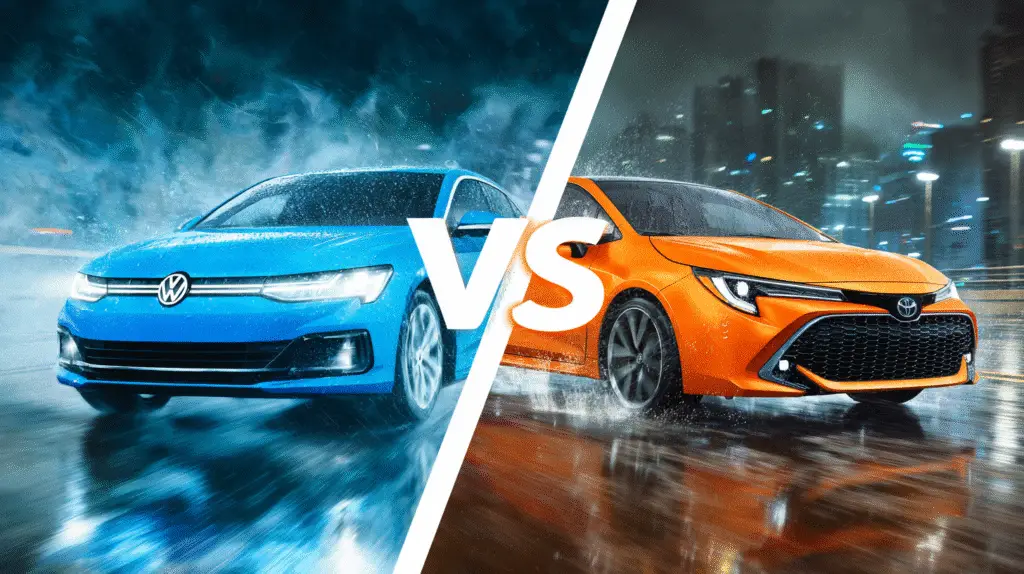
Toyota consistently outperforms Volkswagen in overall reliability metrics and long-term maintenance costs. Data shows Toyota with higher reliability ratings in 4 out of 5 model comparisons, demonstrating a important advantage for buyers concerned with dependability and service expenses.
Long-Term Durability Records
Toyota vehicles boast exceptional durability records with many models regularly surpassing 200,000 miles with proper maintenance. The Corolla and Camry have established impressive longevity benchmarks, frequently running reliably for 15+ years when maintained according to schedule. Consumer Reports and other reliability studies consistently rank Toyota near the top of their reliability rankings year after year. Volkswagen’s durability has improved significantly in recent years, especially with newer models showing enhanced quality control. Historical data indicates Volkswagen models typically experience more issues with electronics and complex systems over time. The gap between Toyota and Volkswagen reliability has narrowed, but Toyota still maintains its edge in long-term durability metrics across multiple vehicle categories.
Maintenance Costs and Parts Availability
Volkswagen maintenance costs average significantly higher than Toyota over a five-year ownership period. According to research by CarEdge, the average five-year cost to own a Volkswagen is $44,693 compared to just $32,449 for Toyota. Comparing similar models reveals even starker differences—the Volkswagen Jetta costs approximately $37,837 over five years while the Toyota Corolla requires only $23,921, representing a substantial $13,916 difference. Toyota’s simpler mechanical designs contribute to more straightforward and less expensive repair procedures. Parts availability presents another distinct advantage for Toyota owners, with widespread aftermarket options keeping replacement component costs lower. Volkswagen parts often require importation and specialized service, driving up maintenance expenses over time. The Volkswagen Tiguan’s five-year ownership costs reach $44,378 versus $36,643 for the comparable Toyota RAV4, illustrating the consistent cost difference across vehicle segments.
| Aspect | Toyota | Volkswagen |
|---|---|---|
| 5-Year Ownership Cost (Average) | $32,449 | $44,693 |
| Corolla vs. Jetta (5-Year Cost) | $23,921 | $37,837 |
| RAV4 vs. Tiguan (5-Year Cost) | $36,643 | $44,378 |
| Parts Availability | Widely available with many aftermarket options | Limited availability; many parts imported |
| Repair Frequency | Fewer repairs needed over vehicle lifetime | More frequent repairs in some models |
| Maintenance Complexity | Simpler systems requiring less specialized service | More complex systems requiring specialized service |
Toyota’s comprehensive warranty programs further enhance its reliability advantage, giving owners additional peace of mind throughout their ownership experience. Volkswagen has made strides in improving quality control but still faces challenges with long-term reliability compared to Toyota’s proven track record. This reliability gap explains why Toyota shows higher retained value ratings in 14 out of 14 model comparisons, even though Volkswagen’s lower initial purchase prices.
Safety Features and Ratings
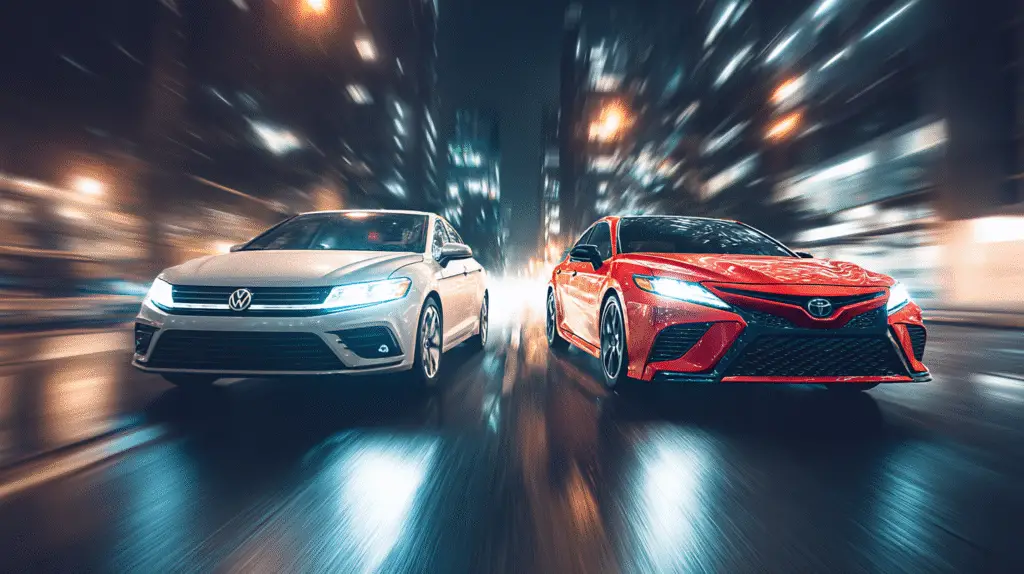
Safety features and ratings represent a crucial consideration when comparing Volkswagen and Toyota vehicles. Comprehensive safety systems, crash test performance, and driver assistance technologies differentiate these manufacturers in meaningful ways that impact your everyday driving experience.
Crash Test Results
Volkswagen models consistently achieve outstanding safety ratings thanks to their robust safety cage construction and strategic use of front and rear crumple zones. These engineering choices effectively absorb crash energy and protect occupants during collisions. Toyota vehicles also perform admirably in crash tests, with models like the RAV4 and Corolla earning high ratings in government and independent evaluations. In exact NHTSA 35 MPH front crash tests, the Toyota Corolla scored 5 stars overall while the Volkswagen Jetta received 4 stars, with the Corolla demonstrating lower risks for head injury criterion and neck injury metrics. Across all vehicle comparisons, Volkswagen has better safety ratings in 6 out of 13 comparisons, while Toyota leads in 2 out of 13, with 5 comparisons resulting in ties between the brands.
Advanced Driver Assistance Systems
Both manufacturers equip their vehicles with sophisticated driver assistance technologies designed to prevent accidents and enhance driving confidence. Volkswagen’s IQ.DRIVE® safety suite includes Adaptive Cruise Control, Lane Keeping System, Travel Assist, Blind Spot Monitor, and Emergency Assist as standard features on models like the 2025 Tiguan. This comprehensive package integrates semi-autonomous capabilities that work together to maintain vehicle control and prevent potential collisions. The 2025 Volkswagen Tiguan comes equipped with 10 standard airbags, including front center, rear side, and driver’s knee airbags, exceeding Toyota RAV4’s 8 airbags. Toyota’s Safety Sense™ technologies, found on the 2025 RAV4 and other models, incorporate essential safety features such as Adaptive Cruise Control and Lane Departure Alert. Toyota’s system offers robust protection but generally covers fewer airbags and emergency connectivity features compared to Volkswagen’s latest offerings. Volkswagen provides additional peace of mind with a 5-year Car-Net® Safe & Secure connected vehicle plan for crash notifications and emergency assistance, creating a more comprehensive safety network for drivers.
Technology and Innovation
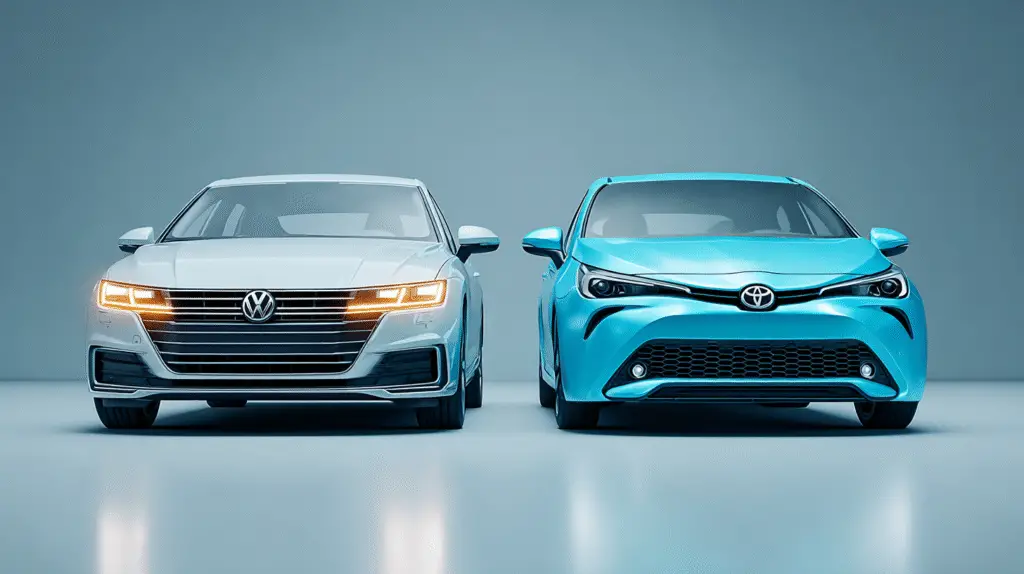
Toyota and Volkswagen both integrate cutting-edge tech features in their vehicles, improving the driving experience in unique ways. Each brand takes a distinctive approach to implementing technology that reflects their core values and design philosophy.
Infotainment Systems
Volkswagen’s infotainment systems showcase the brand’s commitment to customization and driver-focused design. The Digital Cockpit displays offer personalized information presentation, while their Discover Pro navigation system provides real-time map updates with voice-controlled route adjustments. Models like the Taos come equipped with an 8-inch floating touchscreen and Digital Cockpit Pro, creating an integrated tech experience. The Atlas steps up the game with a larger 12-inch touchscreen, though navigation isn’t included as standard equipment in all trims.
Toyota’s infotainment approach emphasizes user convenience and integration across their vehicle lineup. Their systems feature large touchscreens reaching up to 12.3 inches in models like the Grand Highlander, with standard navigation included in many configurations. Toyota’s systems store user-preferred settings via key fobs or smartphones, creating a personalized experience every time you enter the vehicle. The enhanced Bluetooth connectivity supports connection with up to five devices simultaneously, making it ideal for families or carpooling situations.
Connectivity and Smart Features
Volkswagen’s connectivity answers focus on seamless smartphone integration and versatile device support. Their App-Connect technology supports wireless Apple CarPlay, Android Auto, and MirrorLink, eliminating the need for cables when accessing your favorite apps. Models like the Taos offer Wi-Fi hotspot capability, multiple USB ports, and robust Bluetooth connectivity, ensuring you’re never disconnected while on the move.
Toyota’s smart features prioritize convenience and comprehensive integration across devices. Their systems come standard with Apple CarPlay and Android Auto compatibility, while also offering optional connected services that enhance the driving experience. The voice recognition functionality works with audio, climate, and navigation controls, letting you make adjustments without taking your hands off the wheel. Toyota’s infotainment technology links user preferences to individual devices, automatically adjusting settings when you connect your phone or key fob.
Both manufacturers deliver exceptional connectivity options that cater to different user preferences. Volkswagen tends to emphasize customizable displays and seamless wireless integration, while Toyota focuses on intuitive operation and comprehensive device compatibility. The technology offerings from both brands continue to evolve, with each new model year bringing enhanced features that keep drivers connected, informed, and entertained on the road.
Value Proposition
When comparing Volkswagen and Toyota, their distinct value propositions reflect fundamentally different approaches to automotive design and customer experience. These contrasting philosophies shape everything from vehicle performance to long-term ownership satisfaction.
Initial Purchase Price
Volkswagen vehicles typically carry a slightly higher price tag compared to equivalent Toyota models. This premium pricing reflects Volkswagen’s emphasis on quality, performance, and technology integration. For budget-conscious buyers, Toyota offers more competitive pricing across its lineup, particularly in the compact and mid-size segments. Toyota’s approach delivers more standard features for the price, making it an attractive option for practical buyers seeking maximum value from their initial investment.
A comparative analysis of pricing shows Volkswagen offers lower new vehicle starting prices in 10 out of 14 vehicle comparisons. The Volkswagen Jetta starts at $21,995 for the base S trim, while the Toyota Corolla begins at $22,325 for the base LE trim. Even though being slightly more affordable upfront, the Jetta delivers a more premium feel with its upscale interior and additional tech features.
Resale Value and Total Cost of Ownership
Toyota vehicles consistently maintain stronger resale values than their Volkswagen counterparts. This advantage stems from Toyota’s legendary reliability and lower depreciation rates. In fact, Toyota models depreciate at a lower rate in 14 out of 14 direct model comparisons, contributing significantly to a reduced total cost of ownership over time.
The long-term ownership costs reveal a substantial difference between these manufacturers. According to research by CarEdge, the average five-year cost to own a Volkswagen is $44,693, while Toyota’s average is only $32,449. This comprehensive figure includes depreciation, insurance, repairs, financing, and fuel expenses. Comparing exact models highlights this disparity even more clearly – the Toyota Corolla’s five-year ownership cost averages $23,921 versus $37,837 for the Volkswagen Jetta. Similarly, the Toyota RAV4 costs $36,643 over five years compared to $44,378 for the Volkswagen Tiguan.
Toyota’s advantage in retained value appears consistently across all model comparisons, with higher ratings in 14 out of 14 evaluations. The lower maintenance and repair costs associated with Toyota vehicles stem from their simpler mechanical designs, greater parts availability, and more straightforward servicing requirements. These factors combine to make Toyota the more economical choice for long-term ownership even though Volkswagen’s lower initial purchase prices in many segments.
Driving Experience
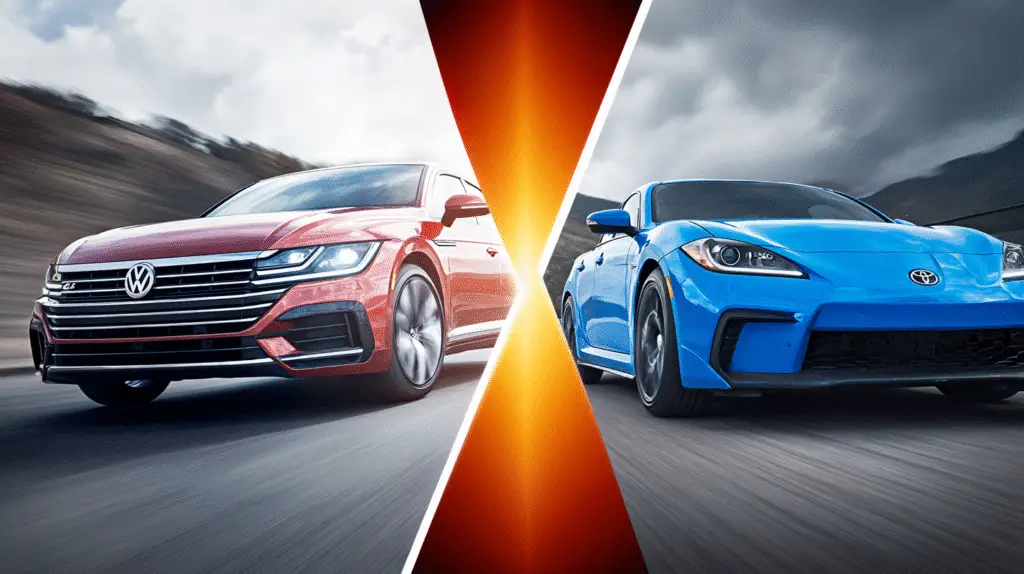
Driving experience encompasses how a vehicle feels on the road, combining handling, comfort, and overall engagement. Volkswagen and Toyota deliver distinctly different driving experiences, with each brand prioritizing different aspects of performance to satisfy their target customers.
Handling and Ride Comfort
Volkswagen delivers a notably sporty driving experience with responsive handling across its lineup. The Golf GTI and Golf R stand out with their agile handling, turbocharged engines, and precise steering response, making them favorites among driving enthusiasts. Jetta models feature well-tuned suspension systems that balance comfort with engagement, creating a fun driving experience without sacrificing daily usability. Volkswagen’s engineering philosophy emphasizes the connection between driver and road, resulting in vehicles that feel composed and confident through corners.
Toyota prioritizes comfort and reliability in its driving dynamics, focusing on smooth, predictable performance. Most Toyota models feature suspension tuning that absorbs road imperfections effectively, creating a relaxed driving experience ideal for daily commuting and long road trips. The Camry and RAV4 exemplify this approach with their comfortable ride quality and predictable handling characteristics. For drivers seeking more excitement, Toyota offers performance-oriented options like the GR Corolla, though these models focus more on straight-line speed than the captivating cornering dynamics found in comparable Volkswagen models.
Interior Quality and Design
Volkswagen interiors reflect the brand’s European design sensibilities with clean, driver-focused layouts. The Golf GTI showcases Volkswagen’s premium approach with upscale amenities including heated and ventilated front seats and high-quality materials throughout the cabin. But, some Volkswagen interior designs trend toward flashy aesthetics that occasionally sacrifice ergonomic functionality. The floating 8-inch infotainment touchscreen in models like the Jetta integrates seamlessly with the dashboard design, creating a modern, sophisticated appearance.
Toyota cabins emphasize functional simplicity and durability with straightforward controls and practical layouts. The GR Corolla features a humble yet likable interior design with a slim, curved dashboard that prioritizes driver visibility and ergonomic functionality. While Toyota interiors generally use less premium materials than their Volkswagen counterparts, they’re engineered for long-term durability and ease of use. The available 10.5-inch touchscreen in higher-trim Corolla models represents Toyota’s commitment to incorporating modern technology without compromising their focus on intuitive operation and reliability.
Conclusion
Choosing between Volkswagen and Toyota eventually depends on your priorities as a car owner. Toyota stands out for exceptional reliability lower long-term ownership costs and superior resale value – making it the smarter financial choice for those planning to keep their vehicle for years.
Volkswagen offers more captivating driving dynamics slightly better safety ratings and premium interior features at a lower initial purchase price. Their vehicles appeal to drivers who prioritize performance and European engineering.
Both manufacturers continue to innovate with advanced technology safety systems and eco-friendly options. Toyota leads in hybrid technology while Volkswagen excels in turbocharged efficiency.
Your ideal choice comes down to what you value most: Toyota’s legendary durability and cost efficiency or Volkswagen’s driving excitement and upscale feel.
Frequently Asked Questions
Which brand offers better long-term value, Toyota or Volkswagen?
Toyota generally offers better long-term value than Volkswagen. Toyota vehicles consistently demonstrate higher reliability ratings, lower depreciation rates, and reduced maintenance costs over time. While Volkswagen vehicles may have lower initial purchase prices, Toyota’s superior durability and lower ownership costs typically result in better value retention throughout the vehicle’s lifespan.
How do Toyota and Volkswagen compare in reliability?
Toyota significantly outperforms Volkswagen in reliability metrics. Toyota vehicles frequently exceed 200,000 miles with proper maintenance, with models like the Corolla and Camry known for exceptional durability. Volkswagen has improved quality control in recent years but still faces challenges with long-term reliability and higher maintenance costs, resulting in Toyota maintaining consistently higher reliability ratings across independent assessments.
Which brand has better fuel efficiency?
Toyota leads in fuel efficiency, particularly with its hybrid technology. The Prius and other Toyota hybrid models excel in fuel economy, especially in urban driving conditions. Volkswagen offers advanced turbocharged engines that balance performance with efficiency, but Toyota’s MPG ratings are generally superior. Toyota’s commitment to hybrid technology gives it a significant advantage in overall fuel efficiency across its lineup.
Are Volkswagen cars safer than Toyota vehicles?
Volkswagen edges out Toyota in safety ratings across several models. Both manufacturers offer comprehensive advanced driver assistance systems, with Volkswagen’s IQ.DRIVE® suite providing more extensive features than Toyota’s Safety Sense™ technologies. Volkswagen vehicles feature robust construction with effective crash energy absorption, though specific models like the Toyota Corolla have scored higher in certain crash test evaluations.
Which brand holds its value better over time?
Toyota vehicles consistently maintain higher resale values than comparable Volkswagen models. This superior value retention stems from Toyota’s exceptional reliability reputation and lower long-term ownership costs. Despite Volkswagen’s lower initial purchase prices, Toyota’s stronger depreciation performance makes it the better choice for consumers concerned about resale value, with some Toyota models retaining up to 15% more value after five years.
How do the driving experiences differ between Toyota and Volkswagen?
Volkswagen prioritizes sporty driving dynamics with responsive handling and power delivery. Models like the Golf GTI offer agile performance that appeals to driving enthusiasts. Toyota, conversely, focuses on comfort, reliability, and predictable driving characteristics. Volkswagen delivers a more engaging experience for performance-oriented drivers, while Toyota provides a smoother, more comfortable ride focused on long-term dependability rather than sportiness.
Which brand offers better technology features?
Both brands excel in different technology aspects. Volkswagen’s infotainment systems emphasize customization and driver-focused design with advanced displays and navigation. Toyota prioritizes user convenience with intuitive interfaces and enhanced connectivity features. Volkswagen focuses on seamless smartphone integration and cutting-edge displays, while Toyota’s systems are designed for straightforward operation and reliability, reflecting each brand’s overall philosophy.
How do interior quality and design compare between Toyota and Volkswagen?
Volkswagen interiors typically feature more premium materials and driver-focused layouts. Their cabins offer sophisticated design elements with high-quality soft-touch surfaces and precise engineering. Toyota interiors emphasize functional simplicity and durability with practical layouts and resilient materials. Volkswagen appeals to those seeking a more upscale feel, while Toyota focuses on creating spaces that will maintain their quality throughout years of use.
What are the main differences between Volkswagen Tiguan and Toyota RAV4?
The Volkswagen Tiguan emphasizes luxury and technology with a refined interior and advanced features, while the Toyota RAV4 focuses on practicality and cargo capacity. The Tiguan offers a more premium cabin experience with sophisticated technology integration, whereas the RAV4 provides superior reliability, better fuel efficiency, and more rugged capability. The RAV4 also offers hybrid options not available in the Tiguan lineup.
Which brand has better warranty coverage?
Toyota offers more comprehensive warranty programs that enhance its reliability advantage. While both manufacturers provide competitive new vehicle limited warranties, Toyota’s reputation for reliability means owners are less likely to need warranty service. Toyota’s warranty coverage includes additional benefits like ToyotaCare, which provides complimentary maintenance for the first two years. Volkswagen has improved its warranty offerings but still doesn’t match Toyota’s overall ownership protection.
Related Posts:
